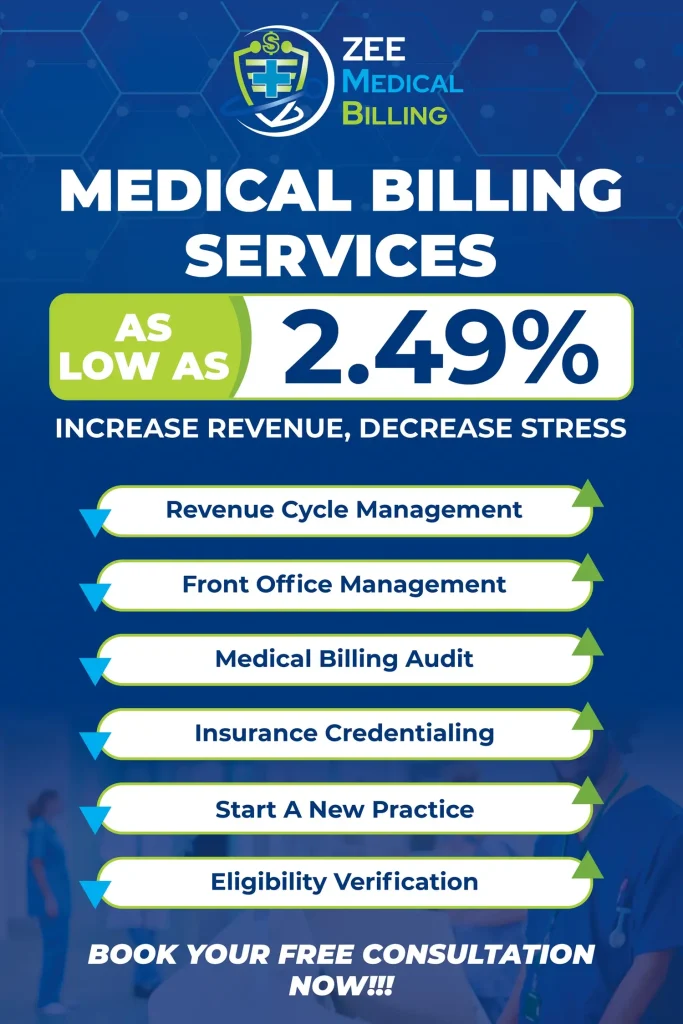Illinois mental health providers face a unique billing landscape that combines federal complexity with state-specific regulations, diverse payer requirements, and constantly evolving Medicaid programs. Whether you’re practicing in Chicago’s urban environment, the suburban collar counties, or downstate communities, understanding the challenges and solutions specific to mental health billing services Illinois can mean the difference between thriving financially and struggling to keep your doors open.
The Mental Health Landscape in Illinois
Growing Demand for Mental Health Services
Illinois has witnessed significant growth in mental health service demand over recent years. The state’s population of nearly 13 million people includes substantial numbers seeking psychiatric care, counseling, substance abuse treatment, and behavioral health services. Urban areas like Chicago, Rockford, and Peoria show particularly high demand, while rural regions struggle with access issues that telehealth is beginning to address.
This increased demand creates opportunities for mental health providers, but it also intensifies the importance of efficient billing operations. More patients mean more claims, more insurance verification, more authorizations, and more potential for billing errors that cost practices real money.
Illinois-Specific Insurance Environment
Illinois operates a unique insurance environment that mental health providers must navigate. The state’s Medicaid program—administered by the Illinois Department of Healthcare and Family Services (HFS)—serves approximately 3 million residents. Private insurance options include major national carriers plus Illinois-based insurers, each with distinct billing requirements.
The state mandates mental health parity, requiring insurance companies to cover mental health services comparably to physical health services. Despite this legal requirement, enforcement remains inconsistent, and providers frequently encounter parity violations requiring appeals and advocacy.
Unique Challenges for Mental Health Billing Services Illinois
Complex State Medicaid Requirements
Illinois Medicaid presents particular challenges for mental health providers. The program operates through multiple managed care organizations (MCOs) in different regions, each with varying policies, authorization requirements, and billing procedures.
Illinois Medicaid Behavioral Health Programs
The state has implemented specialized programs like the Medicaid Behavioral Health Program and initiatives focused on integrated care. While these programs expand access, they also create billing complexity:
- Different service codes for identical clinical services depending on program enrollment
- Varying authorization requirements across MCOs
- Regional differences in covered services
- Complex care coordination billing requirements
- Enhanced case rates that require specific documentation
Navigating these programs without specialized knowledge leaves money on the table or creates compliance risks that can trigger audits.
Parity Law Compliance Issues
Illinois enacted comprehensive mental health parity legislation requiring insurers to provide equal coverage for mental health and physical health conditions. Yet parity violations remain common:
- Stricter medical necessity criteria for mental health claims
- More aggressive utilization review for behavioral health services
- Higher copayments or coinsurance for mental health visits
- More restrictive session limits despite parity requirements
When insurers violate parity laws, effective appeals require specific knowledge of Illinois regulations and federal parity requirements. Professional mental health billing services Illinois understand these laws and advocate effectively for appropriate reimbursement.
Multiple Managed Care Organizations
Illinois Medicaid operates through multiple MCOs including Meridian Health Plan, Blue Cross Community Health Plans, CountyCare, Illinicare, Molina Healthcare, and NextLevel Health. Each MCO has:
- Distinct provider portals and claim submission processes
- Different authorization requirements and timelines
- Varying covered services and benefit limitations
- Unique billing guidelines and documentation standards
Tracking these differences manually becomes overwhelming, especially for practices serving diverse patient populations. Mistakes lead to denials, and denials lead to cash flow problems.
Pre-Authorization Complexity
Illinois mental health providers face extensive pre-authorization requirements that vary by payer, service type, and patient circumstances. Authorization requirements include:
- Initial evaluations (required by some payers, not others)
- Outpatient therapy beyond certain session limits
- Intensive outpatient programs (IOP)
- Partial hospitalization programs (PHP)
- Psychological testing
- Certain medication management services
Missing authorizations result in complete claim denials—not reduced payment, but zero reimbursement for services already provided. The administrative burden of tracking authorization requirements across multiple payers strains practice resources.
Illinois Insurance Landscape for Mental Health Providers
Major Payers in Illinois
Illinois mental health providers typically work with a mix of payers:
Private Insurance:
- Blue Cross Blue Shield of Illinois (largest private insurer)
- Aetna
- UnitedHealthcare
- Cigna
- Humana
- Health Alliance Medical Plans
Public Insurance:
- Illinois Medicaid (through various MCOs)
- Medicare (for eligible patients)
- Veterans Affairs (for veteran populations)
Other:
- Employee Assistance Programs (EAPs)
- Self-pay patients
- Out-of-network arrangements
Each payer category has distinct requirements, reimbursement rates, and billing procedures. Expertise in Illinois-specific policies across these payers directly impacts revenue.
State-Specific Billing Regulations
Illinois Department of Healthcare and Family Services Rules
Illinois HFS establishes rules governing Medicaid billing that extend beyond federal requirements. These state-specific regulations cover:
- Credentialing standards for mental health providers
- Service definitions and covered activities
- Documentation requirements specific to Illinois Medicaid
- Timely filing limits (often 180 days from service date)
- Coordination of benefits rules
- Fraud and abuse provisions with state-specific elements
Violations—even unintentional ones—can result in payment recoupment, future claim denials, or exclusion from Medicaid programs. Understanding these regulations isn’t optional; it’s fundamental to compliance and revenue protection.
Common Billing Challenges for Illinois Mental Health Providers
Credentialing and Paneling Delays
Getting credentialed with insurance panels in Illinois can take three to six months or longer. During this period, providers can’t bill in-network rates, forcing patients to pay higher out-of-network costs or seek services elsewhere.
Credentialing challenges include:
- Incomplete application submissions causing delays
- Primary source verification requirements
- Background checks and license verifications
- Hospital privileges documentation
- Professional liability insurance verification
- CAQH profile maintenance
For practices adding new providers or expanding insurance panels, these delays directly impact revenue and patient access. Proactive credentialing management expedites the process and minimizes revenue loss.
Documentation Requirements
Illinois payers demand thorough documentation establishing medical necessity for mental health services. Generic progress notes don’t suffice. Documentation must include:
- Specific presenting symptoms with severity indicators
- Mental status examination findings
- DSM-5 diagnosis with supporting clinical evidence
- Treatment plan with measurable, time-specific goals
- Interventions used during session
- Patient response to treatment
- Progress toward established goals
- Clinical justification for continued services
Documentation deficiencies are the leading cause of mental health claim denials in Illinois. Even when services are medically necessary and appropriately provided, inadequate documentation triggers denials that require time-consuming appeals.
Telehealth Billing Regulations in Illinois
Illinois expanded telehealth coverage significantly during the pandemic, and many provisions have continued. However, telehealth billing in Illinois involves specific requirements:
- Appropriate place of service codes (typically 02)
- Modifier requirements vary by payer
- Informed consent documentation
- Technology standards meeting HIPAA requirements
- Parity requirements ensuring equal reimbursement
- Licensed location requirements for out-of-state providers
Insurance verification must specifically confirm telehealth benefits, as coverage varies significantly between plans. Some payers cover telehealth for all mental health services; others limit coverage to specific service types or patient circumstances.
Claim Denial Patterns
Illinois mental health providers experience predictable denial patterns:
- Missing authorization: Services requiring pre-authorization submitted without approval
- Timely filing: Claims submitted beyond payer deadlines (often 180 days)
- Medical necessity: Documentation insufficient to support continued treatment
- Coordination of benefits: Primary insurance not billed first
- Credentialing issues: Provider not fully credentialed at service date
- Duplicate claims: Inadvertent resubmission of previously processed claims
Each denial type requires specific corrective action. Without systematic denial management, these issues recur indefinitely, creating chronic revenue leakage.
Solutions for Illinois Mental Health Billing
Specialized Illinois Billing Expertise
Generic medical billing knowledge isn’t sufficient for Illinois mental health practices. You need billing expertise that understands:
- Illinois Medicaid MCO requirements across all major plans
- State-specific parity law provisions and enforcement
- Illinois HFS regulations and policy updates
- Local payer practices and billing preferences
- Regional variations in authorization requirements
- Illinois-specific coding nuances
ZEE Medical Billing provides comprehensive mental health billing services with expertise in Illinois-specific requirements. Their team understands the unique challenges Illinois providers face and implements solutions tailored to the state’s regulatory and insurance environment.
Proactive Credentialing Management
Rather than reactive credentialing that begins when providers join your practice, proactive management anticipates needs and initiates processes early. This approach:
- Begins credentialing applications months before provider start dates
- Maintains current CAQH profiles with complete information
- Tracks recredentialing deadlines to prevent lapses
- Coordinates with payers to expedite processing
- Follows up systematically on pending applications
- Maintains documentation proving credentialing status
Proactive credentialing minimizes revenue loss from provider onboarding and prevents gaps in network participation that disrupt patient care and practice cash flow.
State-Specific Compliance Protocols
Compliance isn’t one-size-fits-all. Illinois-specific compliance protocols address the state’s unique requirements:
- Illinois HFS policy monitoring for Medicaid updates
- State parity law provisions incorporated into appeal templates
- Documentation standards meeting Illinois Medicaid requirements
- Timely filing tracking specific to Illinois payer deadlines
- Coordination of benefits procedures following state rules
- Fraud and abuse prevention aligned with Illinois regulations
These protocols protect practices from compliance violations while ensuring claims meet all state-specific requirements for successful processing.
Technology-Enabled Verification Systems
Manual insurance verification cannot keep pace with the volume and complexity of Illinois mental health billing. Technology solutions provide:
- Real-time eligibility verification across multiple payers
- Automated authorization tracking with expiration alerts
- Benefit detail capture including copays and deductibles
- Telehealth coverage confirmation
- Out-of-network benefit verification
- Integration with practice management systems
Technology doesn’t replace human expertise—it amplifies it, handling routine verification while flagging complex situations requiring human analysis.
Maximizing Reimbursement in Illinois
Understanding Illinois Rate Structures
Reimbursement rates in Illinois vary significantly by payer and service type. Understanding these structures helps practices:
Medicaid Rates: Illinois Medicaid rates for mental health services often fall below commercial insurance rates but vary by service code and MCO. Some services have enhanced rates under specific programs.
Commercial Insurance: Rates are negotiated individually with each carrier. In-network contracts specify fee schedules that vary by provider type, specialty, and geographic location.
Medicare: Federal fee schedules apply, but geographic adjustments create regional variation even within Illinois.
Knowing these rate structures helps practices make informed decisions about insurance panel participation, service mix, and financial projections.
Leveraging State Programs and Initiatives
Illinois has implemented various initiatives supporting mental health services:
- Certified Community Behavioral Health Clinics (CCBHCs): Enhanced reimbursement for qualifying providers
- Medicaid Health Homes: Care coordination payments for integrated services
- School-Based Services: Enhanced rates for mental health services in educational settings
- Crisis Intervention Programs: Specialized reimbursement for crisis services
Participating in these programs requires meeting specific criteria and following particular billing procedures, but they offer revenue opportunities beyond standard fee-for-service billing.
Choosing Mental Health Billing Services in Illinois
When selecting billing services for your Illinois mental health practice, evaluate:
Illinois-Specific Experience: Do they regularly bill for Illinois providers and understand state-specific requirements?
Payer Relationships: Do they have established relationships with major Illinois MCOs and commercial payers?
Credentialing Expertise: Can they handle credentialing across all relevant Illinois payers?
Technology Platform: Does their system accommodate Illinois-specific payer portals and submission requirements?
Compliance Knowledge: Do they understand Illinois HFS regulations and state parity laws?
Denial Management: What’s their track record on appeal success rates for Illinois payers?
Reporting Capabilities: Will you receive detailed reporting on Illinois-specific metrics like MCO performance?
ZEE Medical Billing brings comprehensive expertise in mental health billing services Illinois, understanding the unique challenges providers face in the state. Their specialized mental health billing services address Illinois-specific requirements while providing the full range of revenue cycle management support practices need.
Conclusion
Mental health billing services Illinois providers need must address challenges unique to the state—complex Medicaid MCO requirements, inconsistent parity law enforcement, extensive pre-authorization demands, and state-specific regulations that differ from neighboring states.
Solutions require specialized Illinois expertise, proactive credentialing management, state-specific compliance protocols, and technology systems that accommodate Illinois payers’ distinct requirements. Generic medical billing approaches leave money on the table and create compliance risks that threaten practice viability.
Whether you’re an established practice struggling with Illinois billing complexity or a new provider navigating the state’s insurance landscape, partnering with billing specialists who understand Illinois-specific challenges transforms administrative burden into streamlined revenue generation.
ZEE Medical Billing provides the Illinois-specific expertise mental health providers need, combining comprehensive mental health billing services with deep understanding of the state’s unique regulatory and insurance environment.
Your expertise lies in healing minds and transforming lives. Let Illinois billing specialists handle the state-specific complexities so you can focus entirely on patient care.
FAQs
1. How does Illinois Medicaid billing differ from other states?
Illinois operates Medicaid through multiple regional managed care organizations (MCOs), each with distinct billing requirements, authorization processes, and covered services. The state also has unique programs like Certified Community Behavioral Health Clinics with enhanced reimbursement. Illinois HFS establishes state-specific regulations beyond federal requirements, creating complexity that varies significantly from neighboring states’ Medicaid programs.
2. What are the timely filing limits for mental health claims in Illinois?
Timely filing limits vary by payer. Illinois Medicaid typically requires claim submission within 180 days of service date. Commercial payers often allow 90-180 days, though specific limits are defined in provider contracts. Medicare allows one year for claim submission. Missing these deadlines results in claim denials that generally cannot be appealed, making timely filing tracking essential for Illinois practices.
3. Does Illinois require pre-authorization for outpatient mental health services?
Requirements vary by payer and service type. Illinois Medicaid MCOs often require authorization for initial evaluations, ongoing therapy beyond certain session limits, intensive outpatient programs, and psychological testing. Commercial insurers have varying requirements—some require no outpatient authorization, while others mandate approval after specific session counts. Always verify authorization requirements during eligibility verification.
4. How has telehealth billing changed for mental health services in Illinois?
Illinois significantly expanded telehealth coverage and now requires parity for mental health telehealth services. Most payers reimburse telehealth at rates equal to in-person services. Billing requires appropriate place of service codes (typically 02) and sometimes payer-specific modifiers. Illinois allows licensed out-of-state providers to deliver telehealth services to Illinois residents under certain circumstances, expanding access while creating additional credentialing considerations.
5. What should I do when an Illinois payer denies a claim for violating mental health parity?
Document the parity violation specifically—compare how the payer treats similar physical health conditions versus your mental health service. File a formal appeal citing both Illinois parity laws and federal Mental Health Parity and Addiction Equity Act provisions. Include clinical documentation supporting medical necessity. Consider filing complaints with the Illinois Department of Insurance for persistent violations. Professional billing services experienced with Illinois parity issues can significantly improve appeal success rates.
Follow Us
- Instagram: @zee_medical_billing
- Facebook: ZeeMedicalBilling
- YouTube: Zee Medical Billing Channel
- Twitter/X: @BillingZee
- LinkedIn: Zee Medical Billing Company









